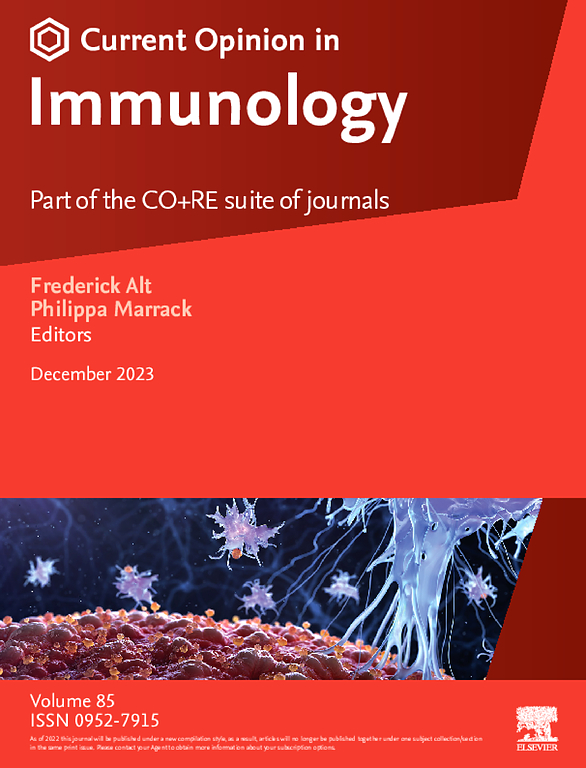COVID-19和炎症性肠病——需要了解什么?
IF 5.8
2区 医学
Q1 IMMUNOLOGY
引用次数: 0
摘要
炎症性肠病(IBD)是一种胃肠道慢性炎症,由遗传易感个体的免疫反应失调之间的复杂相互作用引起。IBD可以进一步分为两个主要亚型,克罗恩病和溃疡性结肠炎。这两种亚型在世界范围内的流行率和发病率都在增加,IBD现在被认为是一种全球流行病。在美国和欧洲,估计约有300万患者患有这种疾病,其中大多数人需要维持治疗,包括免疫抑制剂,这使他们面临机会性感染的风险。2020年,2019年冠状病毒病(COVID-19)在全球流行了很长时间,导致大量住院、重症监护病房(ICU)入院和死亡。患有慢性疾病(如IBD)的患者很快被认为感染和感染相关并发症的风险增加。然而,对于IBD及其治疗,过去几年的证据显示,SARS-CoV-2感染或covid相关并发症的风险没有增加。在这篇综述中,我们将讨论关于COVID-19在IBD患者中的最新见解,特别关注COVID-19的病程和IBD相关的不良结局。本文章由计算机程序翻译,如有差异,请以英文原文为准。
COVID-19 and inflammatory bowel disease — what to know
Inflammatory bowel disease (IBD) represents a chronic inflammation of the gastrointestinal tract that arises from a complex interplay between a dysregulated immune response in genetically predisposed individuals. IBD can further be classified into its two main subtypes, Crohn’s disease and ulcerative colitis. Both subtypes have shown increasing prevalence and incidence rates worldwide, and IBD is now considered a global epidemic. About three million patients are estimated to suffer from this disease, both in the US and Europe, with most of them requiring maintenance treatment including immunosuppressive agents, putting them at risk for opportunistic infections. In 2020, coronavirus disease 2019 (COVID-19) hit the world with a long pandemic period resulting in dramatic numbers of hospitalizations, Intensive care unit (ICU) admissions, and deaths. Patients with chronic illnesses, such as IBD, were rapidly considered to be at an increased risk for both infection and infection-related complications. For IBD and its treatment, however, evidence over the last few years showed no increased risk for SARS-CoV-2 infection or COVID-related complications. In this review, we will discuss the latest insights about COVID-19 in IBD patients with a particular focus on the disease course of COVID-19 and on IBD-related adverse outcomes.
求助全文
通过发布文献求助,成功后即可免费获取论文全文。
去求助
来源期刊
CiteScore
13.30
自引率
1.40%
发文量
94
审稿时长
67 days
期刊介绍:
Current Opinion in Immunology aims to stimulate scientifically grounded, interdisciplinary, multi-scale debate and exchange of ideas. It contains polished, concise and timely reviews and opinions, with particular emphasis on those articles published in the past two years. In addition to describing recent trends, the authors are encouraged to give their subjective opinion of the topics discussed.
In Current Opinion in Immunology we help the reader by providing in a systematic manner: 1. The views of experts on current advances in their field in a clear and readable form. 2. Evaluations of the most interesting papers, annotated by experts, from the great wealth of original publications.
Current Opinion in Immunology will serve as an invaluable source of information for researchers, lecturers, teachers, professionals, policy makers and students.
Current Opinion in Immunology builds on Elsevier''s reputation for excellence in scientific publishing and long-standing commitment to communicating reproducible biomedical research targeted at improving human health. It is a companion to the new Gold Open Access journal Current Research in Immunology and is part of the Current Opinion and Research(CO+RE) suite of journals. All CO+RE journals leverage the Current Opinion legacy-of editorial excellence, high-impact, and global reach-to ensure they are a widely read resource that is integral to scientists'' workflow.

 求助内容:
求助内容: 应助结果提醒方式:
应助结果提醒方式:


